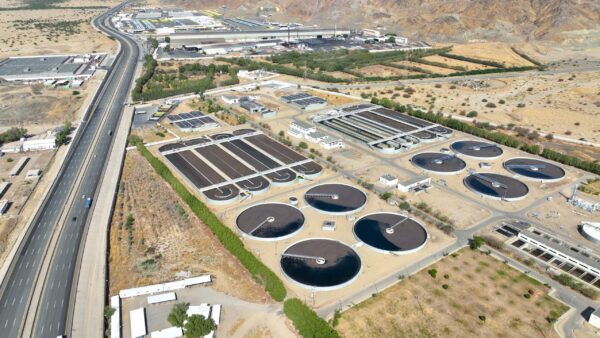

‘Steady as she goes’ is probably the most apt description of Hill International’s activities in North Africa. Breaking ground with the Alexandria City Center Extension Project in Cairo in 2006 as its first foray into that market, Hill has not looked back since. “Prior to that [2006], we were operating remotely from outside the region due to the limited number of activities taking place in North Africa,” commented Waleed Abdel Fattah, senior vice president and North Africa regional manager for Hill International.
At the same time, JR Knowles was already operating in Egypt and its acquisition by Hill provided the latter with a footing and office space. Starting off with a single office in Cairo, today Hill International has developed four offices covering all North African countries. For the project and construction management side of its business, its offices are located in: Cairo, Egypt; Casablanca, Morocco; Tripoli, Libya; and Alger, Algeria. An office is also planned to be opened in Tunisia soon, Abdel Fatah, said
With North Africa being home to Libya and Egypt, two of the leading crude oil and natural gas producers globally, onset of the Arab Spring raised several questions about the political and democratic rights of its indigenous population and along with it the uncertainty that it created in major spending on project activity. “The challenges in North Africa are similar and a bit more than in other neighboring countries due to changes in the political scenarios. However, the situation is going into a more stable state. With the current development plans, the expectation is for the region to experience a boom in opportunities, he said. “Libya has a number of major projects and have plans for spending in the infrastructure sector,” he said, highlighting that the security issue is still a constraint.
With crude oil production being ramped up to 1 million b/d by November, 2014 and that output rising to 1.5 million b/d next year, Libya will once again be assured of its prime source of revenues to fund its planned developments. As for Egypt, with the new government in place, they have set major development plans which are already underway, such as the New Suez Canal; new Nuclear Power Plant; North Coast Development Plan; Golden Triangle; and new development surrounding the Suez Canal. All these are creating more new opportunities in the region.
New Focus Area for Hill
With its North African entity already setting standards in mixed-use developments such as hotels, shopping malls etc, the time has come to start targeting infrastructure. The future is heading towards metros, airports and railways. Success is already at hand, with Hill being awarded a contract by the Cairo Airport Company to provide project management consultancy services for the renovation and development of Terminal Building No. 2 at Cairo International Airport in Egypt. The 15-month contract has an estimated value to Hill of about US$1.9 million.
Cairo International Airport’s Terminal Building No. 2 is undergoing a major renovation effort to double its capacity to 8 million passengers per year. The US$500 million project involves the renovation of the existing terminal building, the construction of new buildings, including a new departure hall, and a new airside pier. The renovation will also include a major upgrading and extension of the airside and landside pavements.
Hill is ramping up its facilities management capabilities as well. “Clients are building state-of-the-art projects, but they are not always able to maintain the facilities and keep them operating at the optimum level. They face the risk of deteriorating facilities,” he said, adding Hill has already been awarded multiple facilities management contracts in North Africa.
10-Year Vision
Hill’s North Africa team is currently working on some iconic ventures that will leave a mark behind in the region’s civil construction sector. They include the Grand Egyptian Museum, billed is one of the largest museum developments currently underway globally. With an allocated area of 480,000 square meters, the museum will be located nearly 2 kms away from the Giza pyramids adjacent to the Giza plateau, and on completion will become the intersection between modern and ancient Cairo directing the public back to the ancient heritage of Egypt. The facility will offer an exhibition area of 35,000 square meters and house 100,000 artifacts.
Hill in already providing its project and construction management expertise for mega projects in Cairo and also has its sights set on getting back on track with Tripoli University and the 25 Universities project in Libya. The projects the company is carrying out in North Africa are not only recognized in the countries they are being built, but also the international community due to their importance, Abdel Fattah said. “Our vision and aim is to continue and further expand our presence and involvement in similar and more important projects that would further strengthen Hill’s name in North Africa,” he concluded.
Hills next stop in Africa is Sub Saharan Africa, which is becoming a magnet for foreign investment. As Hill is already present in Sub Saharan Africa through 2 offices in South Africa, Hill has the opportunity to further develop its presence and cover additional countries in the region and open more offices. New projects are being targeted in the east and west of Sub Saharan Africa, covering Rwanda, Kenya, Uganda, Nigeria and Angola.
The market in Algeria is very promising due to the new developments planned in the country such as the new airport, the metro extensions and other infrastructure developments. Algeria has its self-financing capabilities which makes it one of the rare African Countries with such capabilities and Hill already has its office there supporting the projects and the development plans in the country.
Share

June 23, 2025 | Articles
Jeffrey Hurley Joins Hill’s Northern California Rail Practice

June 23, 2025 | Articles
Ready, Set, Grow: First VP Chad Koelling Takes Charge of Hill’s Mountain West Region

June 8, 2025 | Articles
PMO in Saudi Arabia: The Holistic Approach to Realizing a National Mega-Portfolio

June 1, 2025 | Articles

May 26, 2025 | Articles

May 12, 2025 | Articles
Keeping Your Water/Wastewater Programs Flowing with Public Relations

April 27, 2025 | Articles
Oiling the Machine: Steps to Successful Permitting on Infrastructure Megaprojects

April 20, 2025 | Articles
Sustainable Scaling: Solutions for Managing Risk on Europe’s Data Center Projects